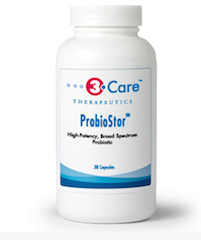Probiotics are microorganisms that offer some form of health benefit to the host – they can be found in various different foods. Probiotics are believed to play very important roles in regulating proper intestinal function and digestion – by balancing intestinal microflora.
These ‘good bacteria’ are considered to be “live microorganisms which when administered in adequate amounts confer a health benefit on the host”, according to the World Health Organization1.
Probiotics are normally consumed in fermented foods with active live cultures such as yogurt.
Probiotics are also available in supplement form as capsules, liquid and chewables. There are many different strains of probiotics, but the most common strains available today in are Lactobacillus and Bifidobacterium.
What are the health benefits of probiotics?
1) Diarrhea
Certain strains of probiotics have demonstrated positive results in treating diarrhea and gastroenteritis. According to a report published in the Journal of Pediatric Gastroenterology and Nutrition2, probiotics are “useful in the prevention or treatment of several gastrointestinal disorders”, such as infectious diarrhea, antibiotic diarrhea, and traveler’s diarrhea.
One study published in the Journal of Pediatrics3, concluded that Lactobacillus species are a safe and effective form of treatment for children with infectious diarrhea. The researchers concluded that “Prophylactic use of Lactobacillus significantly reduced the risk of nosocomial diarrhea in infants, particularly nosocomial rotavirus gastroenteritis.”
However, researchers from the University of Swansea, Wales, UK, reported in The Lancet that probiotic supplements do not reduce antibiotic-associated diarrhea in seniors.
2) Brain function
Probiotics may be beneficial for brain function. Researchers at UCLA found that brain function improved among healthy women who regularly consumed probiotic-containing yogurt.
Lead author of the study, Dr. Kirsten Tillisch, said “Many of us have a container of yogurt in our refrigerator that we may eat for enjoyment, for calcium or because we think it might help our health in other ways. Our findings indicate that some of the contents of yogurt may actually change the way our brain responds to the environment. When we consider the implications of this work, the old sayings ‘you are what you eat’ and ‘gut feelings’ take on new meaning.”
In addition, probiotic bacteria might have the potential to change brain neurochemistry and treat anxiety and depression-related disorders, according to a study published in the journal Proceedings of the National Academy of Sciences (PNAS).
3) Cholesterol
Research presented at the American Heart Association’s Scientific Sessions in 2012 revealed that a formulation of Lactobacillus reuteri NCIMB 30242, is able to reduce blood levels of LDL or “bad” cholesterol.
Mitchell L. Jones, M.D., Ph.D Jones, co-founder and chief science officer of the company that formulated the probiotic said that the study showed that the probiotics can reduce cholesterol esters “and in particular reduce the cholesterol esters associated with ‘bad’ saturated fatty acids in the blood.”
4) Blood pressure
Some studies have found that milk fermented with strains of LAB may help lower blood pressure.4
5) Irritable bowel syndrome
There is growing evidence that probiotics can help treat IBS (irritable bowel syndrome). Two review articles, published in Nutrition in Clinical Practice, examined the therapeutic approaches to irritable bowel syndrome and found that probiotics, specifically Bifidobacterium infantis 35624 (Bifantis®), are very effective at managing IBS.
6) Infection
A study published in the prestigious scientific journal PNAS (Proceedings of the National Academy of Sciences), found that probiotic bacteria can protect against bacterial infection.
The research was the first of its kind to demonstrate that Lactobacillus salivarius offered significant protection against Listeria infection.
7) Psoriasis and Chronic Fatigue Syndrome
Scientists at University College Cork, Ireland, reported in the journal Gut Microbes that Bifidobacterium infantis 35624 may also have benefits for patients with psoriasis and chronic fatigue syndrome.
Bifidobacterium infantis 35624 is a probiotic available in the USA for fortifying the digestive system.
This study is significant, the authors added, because it shows that a single probiotic can affect the systemic immune system in humans, and not only the mucosal immune system.
Probiotic strains
Probiotic cultures naturally occur in certain fermented foods. Below is a list of different strains of probiotic bacteria.
- Bacillus coagulans GBI-30, 6086
- Bifidobacterium animalis subscp. lactis BB-12
- Bifidobacterium longum subsp. infantis 35624
- Lactobacillus acidophilus NCFM
- Lactobacillus paracasei St11
- Lactobacillus johnsonii La1
- Lactobacillus plantarum 299v
- Lactobacillus reuteri ATCC
- Lactobacillus reuteri Protectis
- Saccharomyces boulardii.

